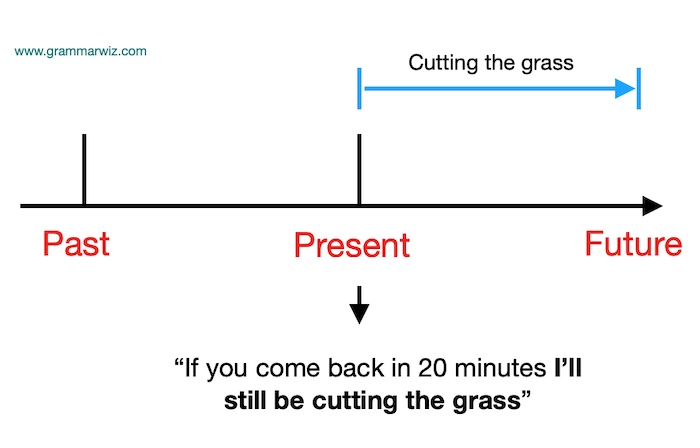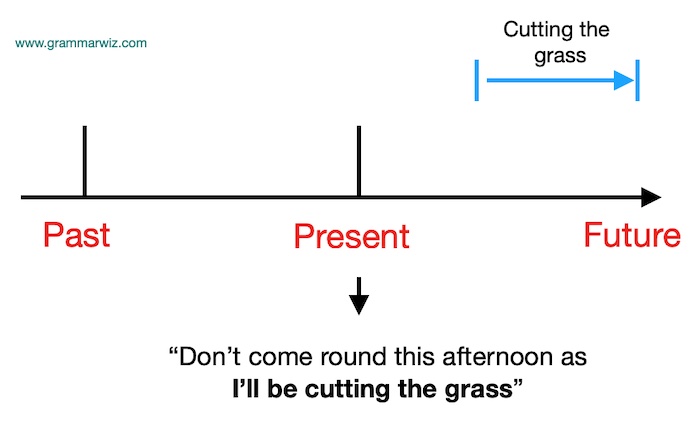Future Continuous Tense with Examples
Here we look at the future continuous tense with examples. The tense is also known as the future progressive tense and it has three main uses which we'll consider in this lesson.
They'll also be several examples of the future continuous tense so it can be seen in use.
This is how it is formed:
Structure:
Subject + will/shall/be going to + be verb+ing
- He'll be arriving late
- We shan't be wanting help anymore
- I'm going to be working all day Wednesday
'Shall' is less common, but it is sometimes used instead of 'will' with I and We. Some grammar lessons on the future continuous discuss only will, but be going to can also be used without much difference in meaning, so be going to will be discussed at the end.
These are the different forms for will:
Affirmative
- I will be working
- You will be working
- He/She/It will be working
- We will be working
- They will be working
Negative (will not/won't)
- I won't be working
- You won't be working
- He/She/It won't be working
- We won't be working
- They won't be working
Yes/No Questions
- Will I be working?
- Will you be working?
- Will he/she/it be working?
- Will we be working?
- Will they be working?
Longer Form Question Examples
- When will I be working?
- Why will you be working?
- Where will he/she/it be working?
- How often will we be working?
- How long will they be working?
When to Use the Future Continuous Tense
It has several principle uses, and we'll look at each in turn:
- Future Events in Progress
- Future Predictions and Expectations
- Polite Requests about the Future
Future Events in Progress
We use the future continuous tense to express actions that will be in progress at specific times in the future. This is the most common grammar explanation and it covers some of the other uses we'll discuss.
It can be illustrated in a timeline:
Examples
Let's say your friend asks you to have a coffee tomorrow at 3pm. You can't go as you are working between 1pm and 5pm (a continuous activity). So you might say:
- Sorry, I can't go as I'll be working then
It can also be used more generally to talk about continuous future activities:
- On Sunday morning I'll be playing tennis
Here are some more examples of the future continuous tense:
- I'll be exercising at the gym later on today
- Arianna would like to come with us but she'll be collecting her son from nursery
- This time next year I'll be living in Spain
This use of the future continuous is often used when we specifically talk about one shorter event interrupting another longer event in the future or a longer event overlapping a shorter one.
This often involves 'when', which is followed by the present simple.
- At 1pm (shorter event) I'll be driving home (longer event)
- When they arrive (interruption), I'll be preparing the lunch (longer event)
- Don't phone me at that time as I'll be sleeping
- I'll be waiting for you when you get home
Don't mix this up with the future simple. We do use specific times with the future simple; however, in that case it's to state when the event in the future will start:
- At 9pm, I'll get ready for bed
So it's not a continuous action, it's when that action will begin.
Future Predictions & Expectations
We also use the future continuous tense to make predictions and guesses about the future.
- I'm guessing you'll be wanting to sleep after your long journey
- I expect you'll be watching the football match later
- You'll be missing John once he's left
The future simple could easily be used for these (e.g. you'll miss John once he's left) but the speaker opts for the continuous tense to emphasise the activity in progress, so it is a personal choice.
Still
We also commonly use the future continuous tense with the word 'still' to talk about things that are happening now but are expected/predicted to continue into the future.
The connotation is often one of slight annoyance/frustration in what is being expressed when we use it.
- If you come back in 20 minutes, I think I'll still be watching the film
(so coming back too soon will disturb the speaker's watching of the film) - It's likely he'll still be feeling unwell tomorrow
- I expect the two political parties will still be fighting over the policy next year
- Will you still be wearing those same clothes next week?!
As we are talking about something that is happening in the present but continuing to the future, the timeline will vary from the one above:

Polite Questions about the Future
The future continuous tense is also used for asking polite questions about the future / someone's future plans.
- Will you be bringing your wife to the party?
- When will you be making a decision?
- Will you be coming by taxi?
- Will you be sleeping over or heading home after dinner?
Again you could reasonably use the future simple for these questions (e.g. will you bring your wife to the party?), but the continuous tense in these situations just makes it sound more polite.
There's also a danger with the future simple that what you say could be mistaken for a request (not a question) as we use the future simple to make requests. For example:
- We're running out of time. Will you make a decision soon, please.
Be Going To
Be going to is also used for the continuous future and can mostly be used interchangeably with will without any alteration in meaning.
When speaking we contract the going to part to gonna.
- Sorry, I can't go as I'm gonna be working then
- On Sunday morning I'm gonna be playing tennis
- I'm guessing you're gonna be wanting to sleep after your long journey
It can sound more long-winded to use instead of will, which is why will is more likely to be chosen.
Negative and Questions
We make the negative simply by adding not before going:
- I'm not going to be working tomorrow afternoon
And questions are formed this way:
- Are you going to be working tomorrow afternoon?
- How long are you going to be working tomorrow afternoon?
State Verbs
As with all continuous tenses, you cannot generally use state verbs (non-action verbs) with the continuous tenses. Rather we would use the future simple tense:
- I'll be being tired later tonight - Incorrect
- I'll be tired later tonight - Correct
- I don't think I'm going to be believing what he says in his speech - Incorrect
- I don't think I'm going to believe what he says in his speech - Correct
Future Continuous Tense with Examples
Here are some more future continuous tense example sentences using will.
Affirmative
- Tomorrow, I will be attending the conference on renewable energy.
- They will be celebrating their tenth wedding anniversary next month.
- By this time next year, she will be working as a software engineer.
- We will be hiking in the mountains during our summer vacation.
- The kids will be playing in the park all afternoon.
- By the time you arrive, we will be watching a movie.
Negative
- I will not be attending the party tonight; I have other plans.
- They will not be renovating the house until the weather improves.
- By this time next week, she will not be studying abroad anymore.
- We will not be using the old software after we upgrade.
- The team will not be competing in the championship due to injuries.
Questions
- Will you be attending the meeting tomorrow morning?
- What will they be doing during their summer break?
- Will she be traveling to Europe next month?
- Where will we be staying during our trip to the beach?
- Will the construction work be ongoing when we visit the city?
- What will you be wearing to the party tonight?
- Will they be watching the live concert online?
- Will she be taking any time off from work for the holidays?
- What will we be eating for dinner tonight?
- Will the kids be joining the summer camp this year?
Practice
Practice what you've learned in these future continuous tense quizzes (using 'will') for the various forms:
New! Comments
Any questions or comments about the grammar discussed on this page?
Post your comment here.













